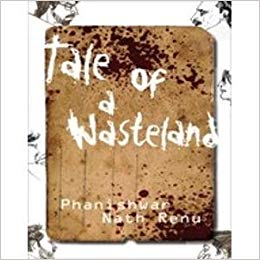Phanishwar Nath Renu (1921-1977) is among the most loved authors of contemporary Hindi literature, particularly for his brilliant first novel Maila Anchal (1954) and celebrated short stories like Tisri Kasam (The Third Vow), Raspiriya and Panchlight. Some of the short stories and Maila Anchal have been translated into English, together with Renu’s short novel Kalankmukta. His second novel Parti Parikatha has long remained in Maila Anchal’s shadow. Its translation by Murari Madhusudan Thakur as Tale of a Wasteland is to be warmly welcomed as an opportunity to return to it with fresh eyes. (Renu’s equally interesting 1965 short novel Julus, about a colony of East Pakistan refugees resettled in North Bihar and their fraught interactions with the nearby village, remains untranslated).
The 1950s were perhaps the most exciting and creative decade of Hindi fiction. We tend to associate it with the new generation of Nai Kahani writers like Mohan Rakesh, Mannu Bhandari, Kamleshwar and Rajendra Yadav, but it was a golden decade for novel writing as well (see Vasudha Dalmia, Fiction as History, Permanent Black 2017). If in 1949 Dharamavir Bharati had made young readers long and cry with Gunahon ka Devta (tr. Chander & Sudha by Poonam Saxena, Penguin India 2015), in 1952 he teased them with the pastiche of Suraj ka Satvan Ghora. Rangeya Raghav published his searing Kab Tak Pukarun in 1957, while Krishna Sobti’s startingly original ‘herstory’, Dar se Bichuri (tr. Memory’s Daughter by Smrit Bharati, Katha 2002), appeared in 1958. Twenty-three year old Renu burst upon this literary scene in 1954 with Maila Anchal, and the novel’s oral quality and playful inventiveness with language, which forces readers to ‘immerse themselves in the oral world’ of speech, songs, and tales, surprised Hindi readers and has continued to delight them ever since.
The first decade after Independence saw several Hindi writers look back to the nationalist movement. In his novel Balchanma (1952) Nagarjun highlighted the transformative experience of the Kisan Sabha in Bihar for small peasants and landless labourers, while in Jhutha Sach (part 1, 1958, tr. This is Not the Dawn by Anand, Penguin India 2010) Yashpal traced the gradual communalization of politics and its effects on the young generation of college students in Lahore. Even Maila Anchal looked back to the final years of the nationalist movement from the peripheral perspective of Maryganj, a village of Purnea district in north-eastern Bihar. But while its title gave the name to a whole ‘anchalik’ genre of novels that supposedly expressed nostalgia for the rural world, the novel actually emphasized the very dynamic nature of the village, with its changing land holdings and caste equation. Through its lively characters, Maila Anchal embodied the differentiated experiences and local understandings of the nationalist movement as opposed to the official history of the movement as a unifying force.

